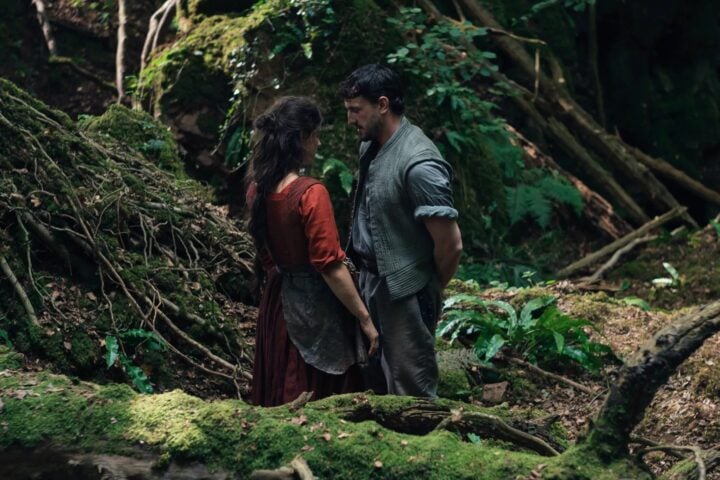“Don’t shush me!” Agnes (Jessie Buckley) demands of her husband, Will (Paul Mescal), during a particularly heated argument midway through Hamnet, Chloé Zhao’s fifth feature film. One of the many odd verbal anachronisms in this otherwise blandly authentic 15th-century period piece, the line also sums up the graver failures in Zhao and co-writer Maggie O’Farrell’s adaptation of the latter’s 2008 novel. Though Hamnet is concerned with bottomless grief and the unique power of art to express the inexpressible, it can’t help but telegraph its themes loudly and incessantly, its emotional register off-puttingly monotonous.
A work of speculative historical fiction, Hamnet follows the life of William Shakespeare and his wife from their initial courtship through the aftermath of the death of their son, Hamnet (Jacobi Jupe), which is suggested as a key inspiration for the creation of the Bard’s most celebrated play. (An opening epigraph notes that Hamlet and Hamnet were identical names in the period’s Old English vernacular.) Mescal’s character isn’t explicitly identified with Shakespeare until late on, but the film does weave in a few references to his work, most notably when Hamnet, his twin sister, Judith (Olivia Lynes), and elder sister, Susanna (Bodhi Rae Breathnach), dress up as the three witches from Macbeth and re-enact the play’s famous introduction.
This scene of the children and their father entertaining their mother is a rare playful moment in a mostly dour, portentous film, but even their domestic bliss feels as though it’s been set up merely to provide contrast to the traumas that will follow. With cinematographer Łukasz Żal alternating between not-quite-static, manicured wide shots and shallow-focus close-ups, Zhao’s film seeks not to observe the nuances of these characters and their relationships patiently, but to wring as much feeling as possible from every interaction or quiet reflection. It’s an approach that becomes overwhelming well before the family is devastated by tragedy.
Hamnet, though, isn’t without the occasional moment of pathos when something convincingly human breaks through its staginess, like Will’s explosive final confrontation with his abusive father (David Wilmot) or Agnes’s emotionally tumultuous second labor, after which Hamnet, initially thought to be born stillborn, unexpectedly takes his first breaths. The performances from the two leads are never entirely predictable, with Mescal demonstrating a kind of elusive strangeness that suggests the superior film Hamnet might have been with more tonal variation. It’s just a shame that their characterizations are so thin, particularly that of proto-hippie Agnes, a falconer and herbal healer whose outsider status is never quite believable.
In The Rider’s and Nomadland’s best moments, Zhao layered a quiet, resigned melancholy beneath the surface of her impoverished characters’ hardscrabble existence, but here she just scratches the surface of the intense personal trauma of parental grief felt by Agnes and Will. And the vast emptiness of rural America certainly seemed to offer more metaphorical richness than the overcast skies and narrow streets of Elizabethan England, in which she fails to find much in the way of lyricism. Those earlier efforts also benefitted from looser staging and the frequent use of non-professional actors, whose performances drew attention to themselves less insistently.
It makes sense, then, that Hamnet’s most interesting images are those that convey its ideas indirectly. Before and after his untimely demise, Hamnet is occasionally shown occupying a kind of white-lit liminal space that resembles both the afterlife and the wings of a theater, alluding to the twin themes of death and creativity. Elsewhere, a brief scene of Will observing a back-alley puppet show suggests the blurring of boundaries between the real and the imaginary in a more interesting way than the debut performance of Hamlet that serves as Hamnet’s finale.
Indeed, Hamnet’s combination of a borderline magical realism and arcane Shakespearean language with rawer depictions of familial strife occasionally lends the film an uncanny aspect that, if brought out a little more, could have been a fascinating exploration of the parents’ unreckonable loss and the consequent impact on their psyche of such an unprecedented experience. But Zhao and O’Farrell’s mostly literal-minded storytelling thwarts any deeper resonance. The film progresses steadily toward a final resolution that, while serving as a form of catharsis, seems also to demean the trauma by suggesting that it can be healed by the staging of a play, as well as diminishing the complex, visionary work of a legendary writer by implying that its origins can be mapped so neatly on to life experiences.
Score:
Cast: Jessie Buckley, Paul Mescal, Emily Watson, Joe Alwyn, Jacobi Jupe, Olivia Lynes, Justine Mitchell, David Wilmot, Louisa Harland, Freya Hannan-Mills, Bodhi Rae Breathnach, Noah Jupe Director: Chloé Zhao Screenwriter: Chloé Zhao, Maggie O’Farrell Distributor: Focus Features Running Time: 125 min Rating: PG-13 Year: 2025 Venue: BFI London Film Festival
If you can, please consider supporting Slant Magazine.
Since 2001, we’ve brought you uncompromising, candid takes on the world of film, music, television, video games, theater, and more. Independently owned and operated publications like Slant have been hit hard in recent years, but we’re committed to keeping our content free and accessible—meaning no paywalls or fees.
If you like what we do, please consider subscribing to our Patreon or making a donation.
